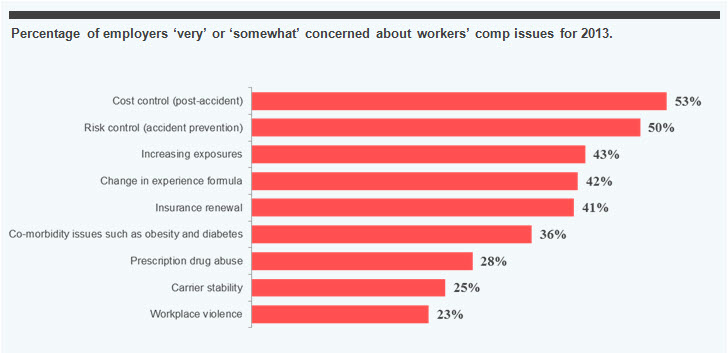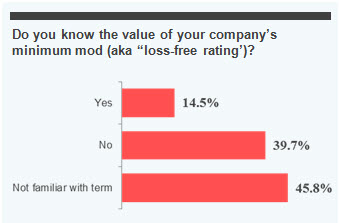For the past week or so I’ve been delving into the details of Zywave’s 2013 P&C Workers’ Compensation & Safety Survey. As always, the responses of over 3,100 survey participants will interest employers and work comp professionals alike, but if I had to express the survey in just one word, that word would be DISCONNECT.
Before I explain myself, let’s look at one metric the survey measured: Employers’ concern for select workers’ comp issues:

I could probably write a full-length article on the ironic tension between the two greatest concerns, post-accident cost control and accident prevention. Other statistics may stand out to you, depending on your role in workers’ comp. However, the following three findings of the survey caught my attention the most because employer responses don’t seem to align with what I read in industry publications, hear at conferences, and discuss with colleagues:
1. What Opioid Crisis?
If you’ve taken even a cursory glance at workers’ comp news in the past year or so, you know that the opioid crisis is dominating industry publications and events. Acknowledging that trend, we added prescription drug abuse to the list of issues for employers to rate their concerns on for 2013. The results? Only 28% say they are very or somewhat concerned about this issue.
Here are a couple of quotes from around the web that illustrate the seriousness of the prescription drug crisis:
There has never been a more damaging impact on the cost of workers’ compensation claims from a single issue than the abuse of opioid prescriptions for the management of chronic pain, according to a new report from Lockton. – WorkersCompensation.com
Many of us in the workers’ compensation arena are well-aware of the increasing use of controlled substances for chronic pain. Although we seldom see the deaths, we certainly see the non-medical use of controlled substances, the emergency room visits for prescription drugs, and the low-function, non-productive states these drugs so often produce. – Richard Thompson, M.D., on ekhealth.com
Why is it that some people in the industry are saying so much about this issue, and yet it’s not on the majority of employers’ radars? Brokers, you can encourage employer awareness by asking questions and delivering content (using Broker Briefcase P&C Edition, of course!) on preventing substance abuse during injury recovery, through wellness programs, and related to individual state mandates.
2. Earning a Bit More Attention: Concerns about Obesity and Diabetes
The problem of comorbidity issues such as obesity and diabetes complicating recoveries has been well-documented for several years, such as in NCCI’s 2010 report “How Obesity Increases the Risk of Disabling Workplace Injuries.” Although I’m not certain, I tend to think this issue has been on our industry’s consciousness longer than the opioid crisis. Maybe that accounts for over a third of employers – 36% – being very or somewhat concerned about this issue.
Is it coincidence or correlation that over a third of adults are obese? I wonder why employer concern isn’t higher, but maybe these words from my Zywave colleague Michelle Jackson address the issue best:
Different messages resonate with different people. The lesson to brokers and employers: don’t give up. Keep messaging, provide healthy food options, host wellness fairs, maintain a supportive environment and measure results. I highly recommend using analytics to measure your group’s preventive care utilization and disease states to discover opportunities and measure success. Read more.
3. The Change in the Experience Rating Formula – But Wait!

As you can see above, 42% of survey participants were very or somewhat concerned about this year’s change in the experience rating formula. That seems relatively reasonable until we get to a later question in the survey: When asked if they know the value of their company’s loss-free rating, or minimum mod, only 15% of employers say yes. How can they be concerned about a change in experience rating if they don’t know what their best mod value is? Over 45% of respondents say they’re not even familiar with the term “minimum mod” or “loss-free rating.”
Despite my dismay at these numbers, we have made a small bit of progress since last year, when only 12% of employers who said they were experience rated knew their minimum mod. This underscores the fact that brokers can make a difference and absolutely have an opportunity to educate and engage with employers on this issue. I believe every employer who has a mod should also know their minimum mod. Even if a company is a small business for which potential premium savings are small, they will value a broker who can “connect the dots” and help them realize that their actions (and inactions) can affect their total work comp costs. For more on this subject, see my blog about our 2012 survey, Stunning Workers’ Comp Survey Results Mean Opportunity for Agents and Brokers.
The Employer – Work Comp Industry Disconnect
As with last year’s survey, I think these results exemplify why all of us in the industry must keep talking, keep educating, and keep sharing what we know based on experience and analytics. I am reminded of the famous Cool Hand Luke quote: “What we’ve got here is failure to communicate.” I don’t mean to imply the problem is as simple as broker not talking or employers not listening, but somehow the right connections aren’t being made. Are there more effective ways for us to share, and to convince employers that their efforts and priorities can make a difference?
As always, I welcome your comments!
– Kory Wells, WorkCompEdge Blog Editor
© 2013 Zywave, Inc. All rights reserved. For reprint permission, contact the blog editor.
For more about the survey, read:
- Survey: Cost Control Edges Accident Prevention as Employers’ Top Workers’ Comp Concern
- 2013 P&C Workers’ Compensation & Safety Survey on Broker Briefcase (Available to our partners using ModMaster or Broker Briefcase. To find the survey, access Briefcase directly or through the Next Steps area of ModMaster, then search for 2013 Survey Results: Workers’ Compensation.)



